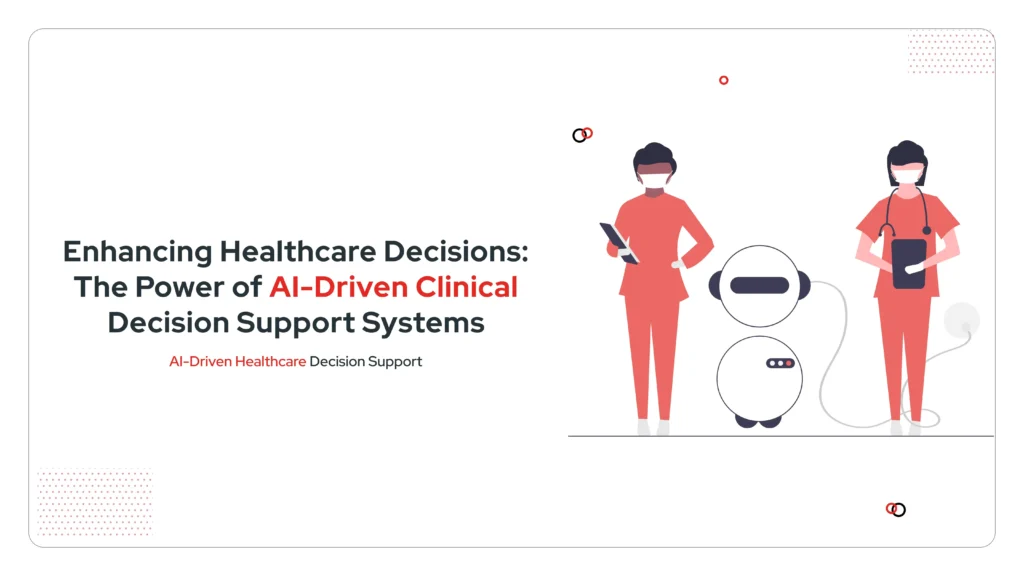
What is Clinical Decision Making?
Clinical Decision Making (CDM) is the process healthcare professionals use to choose the most appropriate course of action for a patient’s care. It involves assessing patient information, considering available evidence, and drawing on expertise to make informed decisions that optimize patient outcomes.
AI-Driven Clinical Decision Support Systems (CDSS) leverage artificial intelligence and data analytics to enhance healthcare decisions. These systems analyze vast amounts of patient data, including medical records and research findings, to provide real-time recommendations to clinicians. AI decision-making software can identify patterns, suggest diagnoses, predict patient outcomes, and recommend treatment options. This technology helps healthcare providers make more accurate, evidence-based decisions, reduce errors, and improve patient care. AI-based clinical decision-making augments human expertise by providing timely and relevant information, ultimately enhancing healthcare decision-making and positively impacting patient outcomes.
Understanding Clinical Decision Support Tools and Systems
Clinical Decision Support Tools are computer-based tools integral to healthcare, aiding professionals in informed patient care decisions. These AI decision-making software and systems rely on medical knowledge and patient data, furnishing recommendations and alerts to guide clinicians in diagnostics, treatment, and overall decision-making. Clinical Decision Support Tools encompass components like medical databases, algorithms, and rules engines that analyze data to generate insights.
Their role in healthcare is multifaceted: they offer access to current medical literature and guidelines, issue real-time alerts, enhance diagnostic precision, suggest treatment plans, and promote adherence to protocols. Nevertheless, healthcare professionals confront formidable challenges in complex decision-making, including information overload, time constraints, varying expertise levels, cognitive biases, and evolving guidelines. Clinical Decision Support Tools serve as a valuable solution by delivering timely, evidence-based support to help healthcare providers navigate these challenges and deliver high-quality care.
Key Features of AI Decision-Making Software in Clinical Decision Support Tools
- Machine Learning Algorithms
Clinical Decision Support Tools employ machine-learning algorithms to identify patterns, trends, and correlations within patient data. These algorithms can learn from historical data and adapt to new information, allowing for more accurate diagnoses and treatment recommendations.
- Clinical Guidelines Integration
Many Clinical Decision Support Tools incorporate clinical guidelines and best practices, ensuring that healthcare professionals adhere to established standards of care. These systems can automatically align decisions with the latest clinical guidelines.
- Predictive Analytics
AI-enabled Clinical Decision Support Tools can predict patient outcomes and identify at-risk individuals. This helps in early intervention and proactive healthcare management, improving patient outcomes and reducing healthcare costs.
- Real-time Alerts and Notifications
AI-driven Clinical Decision Support Tools provide real-time alerts and notifications to healthcare providers. These alerts can warn about potential drug interactions, allergies, or critical patient conditions, reducing the risk of errors.
How AI Decision-making Helps in Healthcare
AI decision-making in healthcare offers transformative benefits by enhancing various aspects of patient care. AI-driven systems analyze vast datasets, enabling early disease detection, precise diagnostics, and personalized treatment recommendations. They assist in optimizing resource allocation, such as predicting patient admissions and managing hospital workflows efficiently.
AI-powered clinical decision support tools improve healthcare professionals’ decision-making by providing real-time information, flagging potential errors, and aligning care with evidence-based guidelines. Additionally, AI fosters patient engagement through telemedicine and health monitoring apps, promoting proactive self-care. While AI augments human expertise, it also aids in automating administrative tasks, reducing healthcare costs, and minimizing errors. Overall, AI-driven decision-making in healthcare leads to improved patient outcomes, streamlined operations, and a more sustainable and patient-centric healthcare ecosystem.
Also Read: The Power of Natural Language Processing (NLP) in Healthcare
Leading Healthcare Decision Support Tools Aiding Clinical Decision Making
- VisualDx
VisualDx specializes in diagnostic decision support, particularly in dermatology, helping clinicians identify and diagnose skin conditions through a visual database.
- Epic Systems
Epic’s EHR system incorporates clinical decision-making support features, such as Best Practice Advisories (BPAs) and clinical pathways, to help healthcare providers make informed decisions.
- 3M Health Information Systems
3M offers coding, classification, and clinical documentation improvement solutions that help healthcare organizations optimize decision-making and coding processes.
- IBM Watson Healthcare
IBM’s Watson Healthcare offers a suite of AI-powered tools and solutions for healthcare decision support, including Watson for Oncology, which assists in cancer treatment decisions, and Watson Health Imaging, which aids in radiology diagnostics.
Conclusion
In conclusion, integrating AI-driven clinical Decision Support Systems (CDSS) into healthcare represents a significant leap forward in our ongoing quest to enhance healthcare decisions and, by extension, patient outcomes. These advanced tools leverage the power of artificial intelligence to process vast amounts of data, deliver evidence-based recommendations, and assist healthcare professionals in making more accurate and timely decisions.
As we look to the future, the continued evolution of AI in healthcare promises even greater enhancements in AI decision-making. This will ultimately lead to a healthcare system that is safer, more efficient, and more effective in meeting the diverse needs of patients worldwide. Embracing and harnessing the power of AI-driven CDSS is a pivotal step in this transformative journey toward better healthcare for all.